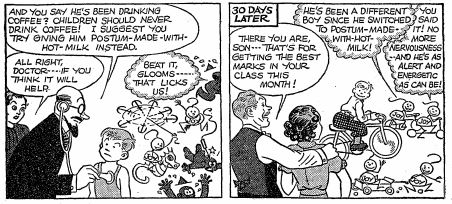In today’s health obsessed culture of fit watches and online trainers, it seems that most Americans should have a pretty solid grasp on what is and is not good for them. However, with the constant inundation of “new studies” and “fitness breakthroughs,” it can be tough to tell what is really new information and what is actually just clever marketing. Any kid who ever reached for their parent’s steaming mug as a child or tossed back an espresso or two for a term paper all-nighter may have heard the familiar scolding, “Kids shouldn’t drink coffee. It will stunt your growth.” Whether that seemed like a fair trade at the time or kept you off coffee for life, you may be shocked to learn that this potential “health risk” was actually the advertising creation of the Post Cereal Company (now Post Consumer Brands, LLC) in the early 20th century.
Before he started stuffing children full of incredibly healthy favorites like Fruity Pebbles and Waffle Crisp, cereal tycoon C.W. Post first developed a “cereal-based, caffeine-free coffee substitute” called Postum. While the product did not contain any caffeine, tasted nothing like coffee, and only vaguely resembled the brownish morning beverage, it was marketed as a healthy alternative for the old, the young, or anyone afflicted by the “dangerous” side effects of coffee. Unfortunately, there wasn’t any concrete, scientific evidence to support the claims that coffee was unhealthy, other than occasional jitters or nervousness it could cause when consumed in excess. Fortunately for Post, their advertising didn’t need evidence; just a strong campaign with a story that was just believable enough to scare up some customers.
Post began running newspaper ads that read like a doctor’s interview, listing symptoms (some real and some imagined) that immediately ceased when the afflicted switched from coffee to healthier Postum. Furthermore, the ads claimed that coffee was often consumed as a replacement for milk as a morning beverage, leaving the drinker without their daily requirement of calcium. This lack of calcium, they claimed, was responsible for everything from dyspepsia to weakness to, you guessed it, stunted growth. Postum’s ads implored readers to switch from coffee themselves and to protect their children from the dangers of malnourishment and impeded development caused by coffee. In doing so, Post managed to pilfer one generation of consumers and secure the next in one fell swoop.
With the story of coffee’s danger to children firmly in place, the Post Cereal Company established itself as a nationwide corporation. When the U.S. joined World War II, Postum enjoyed even more success as coffee was rationed in the States. Not only was Postum now the healthy choice, but it was the moral and economic choice in a time when coffee was needed to energize the troops overseas. Though Postum enjoyed a long and profitable popularity in the U.S., the coffee renaissance of the 1990’s firmly re-established coffee as both a luxury and a necessity, leaving its substitute unable to compete. Post Consumer Brands, LLC discontinued Postum in 2007, but the effects of its once genius marketing campaign have not been forgotten. The question of coffee stunting growth is still a popular one on online health, lifestyle, and coffee forums alike, and while there has never been any concrete evidence to support this claim, many parents and young people alike still stick to the “better safe than sorry” philosophy when it comes to coffee.
“Sponsored Articles” About the Dangers of Coffee
- Self-Delusion: Many People Deceived by Coffee Bayfield Blade January 9, 1914
- Eye Strain Relieved by Quitting Coffee Littleton Independent June 19, 1914
- Why the Doctor asks: Do you drink coffee? Akron Weekly Pioneer Press October 19, 1923
- When Coffee Disagrees Use Postum Cereal Range Ledger October 30, 1920
- The Folly of Cheating Nature Summit County Journal September 10, 1921
- Why should you follow a crooked path? Creede Candle November 5, 1921
- You are entitled to the benefit of the doubt Range Ledger January 14, 1922
- Many ambitious men and women live only half a life and dont know it Range Ledger January 28, 1922
- Topics in History: Intersectionality in Colorado: Women’s Rights are Human Rights - March 15, 2019
- Black History is Colorado History - February 22, 2019
- Celebrating Black Voices with the Book Club Resource - February 15, 2019